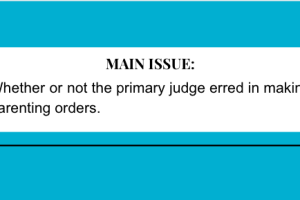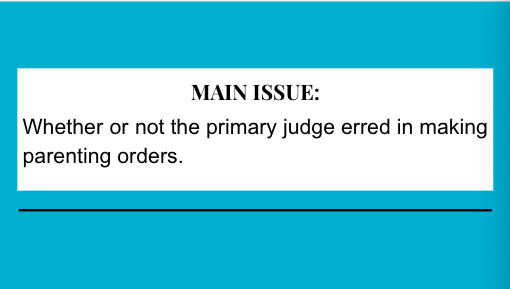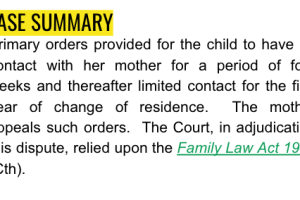- · 4849 friends
Mother Appeals Parenting Orders

Ervin & Allum [2022] FedCFamC1A 172 (21 October 2022)

Primary orders provided for the child to have no contact with her mother for a period of four weeks and thereafter limited contact for the first year of change of residence. The mother appeals such orders. The Court, in adjudicating this dispute, relied upon the Family Law Act 1975 (Cth).

Facts
The primary judge found that the mother's firmly held belief that the father had sexually abused their daughter was misinformed, rather than made for malicious purposes.
It was accepted that removing the child from her primary attachment figure, her mother, and placing her in the sole care of her father, who the child genuinely believed had sexually assaulted her, was likely to cause significant distress and loss to the child. This was in circumstances where there was no assurance that other adults would be present, as support for the child, in the father's household, due to the fact that the father was living alone after the breakdown of a subsequent relationship he had entered into following his separation from the mother.
The orders provided for the child to have no contact with her mother for a period of four weeks and thereafter limited contact for the first year of change of residence.
The appellant's first ground of appeal is that the judge erred by failing her obligation to give adequate reasons and acting on the wrong principle where the orders are harsh, weighting evidence in such a manner that it has led to an injustice.
The appellant is concerned about inadequate reasons being provided by the primary judge in respect to the following matters:
- A cold switch to the father, who the child had not seen in 14 months;
- The mother only spends time with the child 4 hours per month (supervised) for the first six months, then 4 hours every second weekend for the following six months (supervised changeovers);
- No provision for the child to spend time with her extended family within the first 6 months without the father’s consent;
- After a year, the child spends fortnightly weekends (after school Friday to before school Monday) with her mother with no provision for blocks of time such as during school holidays;
- There is no provision within the Orders for telephone or email contact; and, the mother may only attend the child’s school with the father’s written permission.
The mother further contended that the failure by the primary judge to address those matters constituted an error of principle in that the orders do not facilitate the child having a meaningful relationship with the mother.

Issue
Whether or not the primary judge erred in making parenting orders.
Applicable law


Analysis
The mother, in her oral submissions, stressed that she was not attempting to re-argue her case and stated several times that she accepted the primary findings i.e. that the father did not sexually abuse the child and does not present an unacceptable risk of doing so in the future.
The meaning of the phrase “meaningful relationship” is not defined in the Act but has [been] interpreted by the Full Court as meaning a relationship that is “significant” “important” or “of consequence”.
The word ‘meaningful’ is qualitative rather than quantitative and the phrase has not been interpreted as requiring the Court to craft orders to support an optimal relationship, or creating a presumption that a child does receive a benefit from having a meaningful relationship with both parents.
The mother’s focus on the quantitative, e.g. 72 days per year, rather than the qualitative, does not establish any failure on the part of the primary judge to provide for the child to have the benefit of a meaningful relationship with the mother in the future.
In relation to the primary judge’s failure to provide for the child to spend holiday time with the mother, the primary judge gave careful consideration to such provision at [460], but ultimately accepted the ICL’s submission that: ...the risk to the child that would be raised if she were to make further disclosures and/or experience difficulties in the father’s care, are heightened if there were to be lengthy periods of overnight time with the mother, such as in the school holiday period as proposed by the father.
Given the uncertainties about the success of the mother’s engagement in therapy “having regard to the steadfast nature of her beliefs” (at [459]), the primary judge, in our view, went as far as possible in making predictions and assumptions about what would best meet the needs of the child in the foreseeable future by the specific ‘spend time with’ provisions in the order, while leaving open the prospect of extended time in the future if the parents agreed.
The form of the injunction made against the mother was adopted by the primary judge from the Amended Minute of Order proposed by the ICL (at Exhibit 20) despite the father proposing something less restrictive i.e. the mother giving the father 24 hours’ written notice of an intention to attend at the child’s school.
It does not appear that any submissions were made by the mother at trial opposing the injunctions proposed against her by the ICL and/or the father, despite having the opportunity to do so.
Conclusion
The appeal is dismissed. The appellant is to pay the respondent’s costs fixed in the sum of $6,206 within 7 days.

















